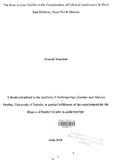| dc.description.abstract | This study sought to bring out the role of tour guides in the conservation of cultural landscapes. The research specifically probed their potential role in the conservation of Mount Kenya which is faced with threats to its wellbeing. The research was carried out in Kieni East Division in Nyeri North District. The study had two objectives: to investigate roles that tour guides can render in the conservation of Mount Kenya cultural landscape and to examine how the roles can be integrated in the conservation programmes of Mount Kenya cultural landscape. It was guided by the value- belief-norm theory of the environmental movement. Probabilistic sampling design was used to select a study sample of thirty individual tour guides who became the key respondents. Primary data were obtained through interviews, focus group discussions and direct observation while secondary data were obtained from written texts in libraries and internet journals.
The data were then processed into tables and analyzed in percentages while information from direct observation and secondary data was recorded in direct speech, quoted or recorded on digital camera. The information acquired from the study indicated that tour guides are keen on current conservation problems and needs of Mount Kenya and are willing to be part of the solution to the problems. It emerged that tour guides are aware of the effects of degradation both within and without the Mount Kenya protected area in which case they were able to correlate the human economic activities that may be a danger to the well being of the mountain environmental well-being.
It was also established that the tour guides have in the past offered environmental care to the mountain despite the fact that their continued participation in the conservation work has been curtailed by authorities. Their participation has been kept superficial in the sense that they sometimes receive invitations to attend educational forums such as workshops and seminars on conservation but do not get space to practice what they learn and from their practical experience on Mount Kenya.
The research, therefore, recommends that the tour guides' knowledge obtained through experience needs to be utilized to enhance government's conservation efforts. Their conservation initiatives ought to be supported and encouraged by conservation agencies. The training of tour guides also need to be enhanced and sustained. Finally, ways of motivating tour guides need to be initiated to perpetuate and sustain their eagerness in giving care to the threatened Mount Kenya cultural landscape. | en_US |

